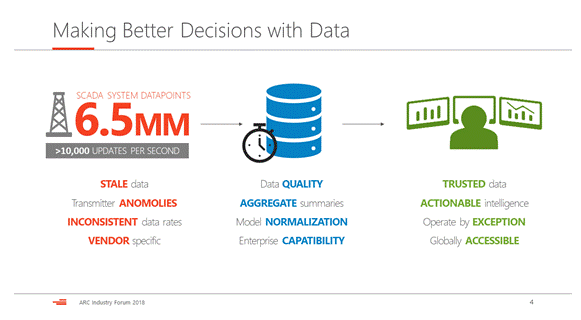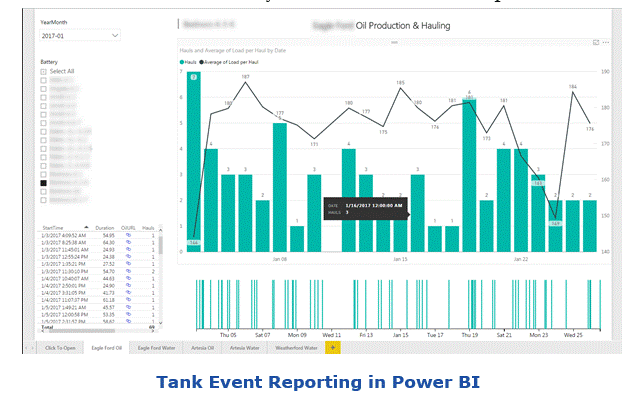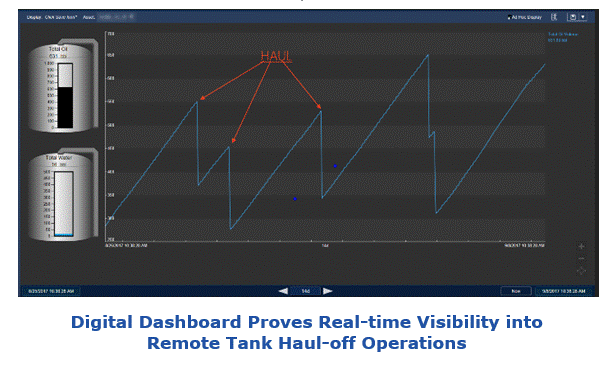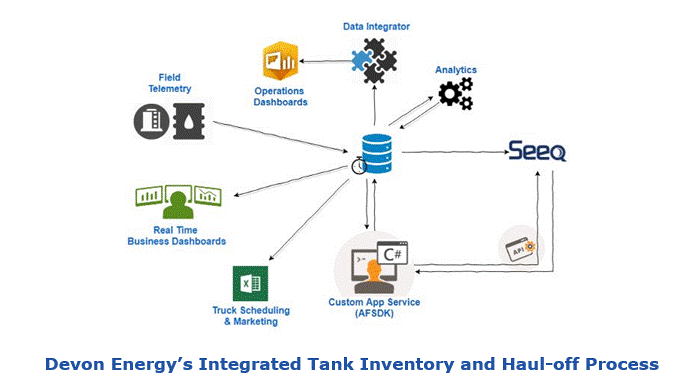

Real-time operations and business operations have different data requirements. SCADA data users need real-time data to make decisions. According to Don Morrison, Real Time Data Engineer at Devon Energy, the company’s SCADA system was designed to support operations. However, SCADA data often has abnormalities. For example, when a sensor fails or is brought off line for maintenance, data averages can become inaccurate. In cases such as these, the data must be cleansed by removing abnormalities. Devon Energy has found that advanced analytics improves operations data. They achieve this by combining the real-time system and Seeq metrics to remove some of the abnormalities and improve data quality. Once this is done, the company incorporates the cleansed data into real-time operational dashboards to support drilling and production users as well as business users. For operations users, these dashboards typically provide both basic monitoring information and higher level operational status.

The company’s business users, on the other hand, typically want a higher level of aggregated data for daily, weekly, or monthly reports and need to see the data in even time intervals.
Inconsistent data uptake rates can also represent a challenge for some SCADA systems. Some assets may update data every second, others once an hour, and still others once per day. Business users often require additional data analysis and manipulation to align these data for business intelligence. Aligning different operational data types by consistent time intervals for business users typically requires additional data analysis and manipulation. Devon Energy does this by putting the SCADA data into a SQL-like table database accessible to many of its business users.
At Devon Energy’s unmanned, remote production sites, the liquid haul-off process for the tank battery used to separate the oil, water, and gas components, previously involved a significant amount of manual data entry. This surprisingly complex operation involves custody transfer of oil and water from the production facility to a tanker truck to move the product to a point of sale for marketing purposes. Ideally, trucks are dispatched to site when the tanks approach capacity, but not any sooner. That’s because Devon pays to transport a full load, whether or not the truck is actually filled. On the other hand, if the tanks are not emptied in time, the company would have to halt production, which would be even more costly.
In the past, the truck drivers would simply write the amount of oil or water taken and put it in a mailbox hidden somewhere on the site. Various employees around the company then manually entered this information into spreadsheets. As a result, the company could never be sure that what the trucker wrote down was accurate or if there was spillage, which was a problem for marketing. The central operations group had no idea what the contracted truck drivers were doing, or even when they were on site, which posed an operational and safety risk. The entire process was slow, time-consuming, and error prone.
To improve real-time visualization and situational awareness, digital dashboards were developed to enable operators to see when haul-off events occurred, determine how much oil or water was taken, and detect any spills or other issues in real time. The dashboards also showed when the tanks were filling up so the remotely located operators could dispatch trucks in time to avoid having to shut down production.

Now that they could visualize the haul-off events, the company wanted to be able to predict when future haul-off events would be required, with enough lead time to optimize the process from both the operational and marketing perspectives. To reduce the time and effort needed to develop this solution, the company implemented the Seeq predictive analytics tool.

“Using the Seeq tool, we can now determine exactly how much oil was taken during each event by matching up the time series data to when the haul-off event started and ended. This enables us to accurately and quickly estimate events using an interactive inventory and haul-off analytics approach built into the tool.”
As Mr. Morrison explained, Devon’s process tests the data in real time, takes the data and runs it through the tool to get an output to their assets, and applies the technology to the company’s approximate 1,200 battery storage units. Using the Seeq API technology, they process the data, write the data back into the historian system, then make the intelligence available for the operational dashboards.
Using Seeq applications in conjunction with the company’s real-time system and other tools, Devon Energy can normalize its data, predict events, improve scheduling, and accommodate update requests quickly. Devon improved ability to predict haul-off events. The technology also enabled the ability to improve intelligence and react to the data faster, and improve truck haul-off scheduling. Using the available data platform and analytics tools, Devon Energy is able to gain actionable insight from the data it was already collecting.

ARC Advisory Group believes that companies should focus on making data actionable and transforming the data into value. Companies should use analytical tools to make better decisions. Data quality is important.
For more information about this application see the Devon Energy Uses Real Time Advanced Analytics for Better Decisions ARC insight.

